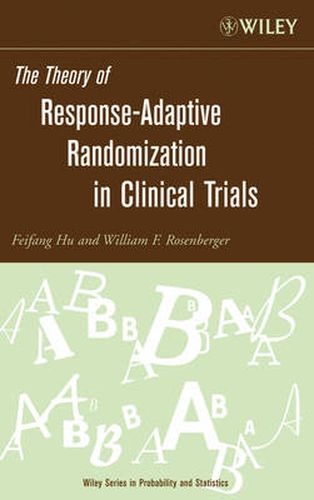Readings Newsletter
Become a Readings Member to make your shopping experience even easier.
Sign in or sign up for free!
You’re not far away from qualifying for FREE standard shipping within Australia
You’ve qualified for FREE standard shipping within Australia
The cart is loading…






Presents a firm mathematical basis for the use of response-adaptive randomization procedures in practice The Theory of Response-Adaptive Randomization in Clinical Trials is the result of the authors’ ten-year collaboration as well as their collaborations with other researchers in investigating the important questions regarding response-adaptive randomization in a rigorous mathematical framework. Response-adaptive allocation has a long history in biostatistics literature; however, largely due to the disastrous ECMO trial in the early 1980s, there is a general reluctance to use these procedures. This timely book represents a mathematically rigorous subdiscipline of experimental design involving randomization and answers fundamental questions, including: * How does response-adaptive randomization affect power? * Can standard inferential tests be applied following response-adaptive randomization? * What is the effect of delayed response? * Which procedure is most appropriate and how can most appropriate be quantified? * How can heterogeneity of the patient population be incorporated? * Can response-adaptive randomization be performed with more than two treatments or with continuous responses? The answers to these questions communicate a thorough understanding of the asymptotic properties of each procedure discussed, including asymptotic normality, consistency, and asymptotic variance of the induced allocation. Topical coverage includes: * The relationship between power and response-adaptive randomization * The general result for determining asymptotically best procedures * Procedures based on urn models * Procedures based on sequential estimation * Implications for the practice of clinical trials Useful for graduate students in mathematics, statistics, and biostatistics as well as researchers and industrial and academic biostatisticians, this book offers a rigorous treatment of the subject in order to find the optimal procedure to use in practice.
$9.00 standard shipping within Australia
FREE standard shipping within Australia for orders over $100.00
Express & International shipping calculated at checkout
Presents a firm mathematical basis for the use of response-adaptive randomization procedures in practice The Theory of Response-Adaptive Randomization in Clinical Trials is the result of the authors’ ten-year collaboration as well as their collaborations with other researchers in investigating the important questions regarding response-adaptive randomization in a rigorous mathematical framework. Response-adaptive allocation has a long history in biostatistics literature; however, largely due to the disastrous ECMO trial in the early 1980s, there is a general reluctance to use these procedures. This timely book represents a mathematically rigorous subdiscipline of experimental design involving randomization and answers fundamental questions, including: * How does response-adaptive randomization affect power? * Can standard inferential tests be applied following response-adaptive randomization? * What is the effect of delayed response? * Which procedure is most appropriate and how can most appropriate be quantified? * How can heterogeneity of the patient population be incorporated? * Can response-adaptive randomization be performed with more than two treatments or with continuous responses? The answers to these questions communicate a thorough understanding of the asymptotic properties of each procedure discussed, including asymptotic normality, consistency, and asymptotic variance of the induced allocation. Topical coverage includes: * The relationship between power and response-adaptive randomization * The general result for determining asymptotically best procedures * Procedures based on urn models * Procedures based on sequential estimation * Implications for the practice of clinical trials Useful for graduate students in mathematics, statistics, and biostatistics as well as researchers and industrial and academic biostatisticians, this book offers a rigorous treatment of the subject in order to find the optimal procedure to use in practice.